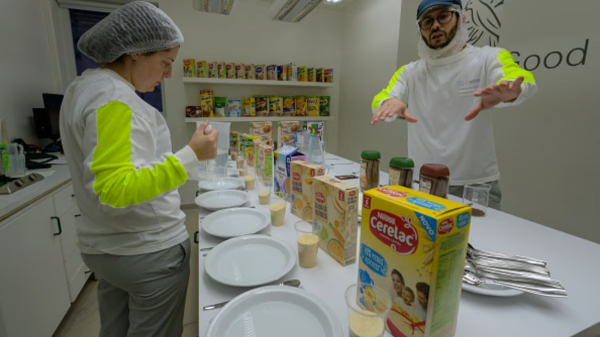Nestle's potential regulatory trouble in India over sugar issue; brand clarifies
Nestlé adds sugar to infant formulas sold in less affluent countries, including India, but not in its key markets such as Europe or the United Kingdom, ToI rep
- by B2B Desk 2024-04-19 08:53:55
The Food Safety and Standards Authority of India (FSSAI) has launched an investigation into the controversy surrounding the sugar content in Nestlé Cerelac products.
In response to these allegations, the FSSAI reiterated its commitment to investigate the matter thoroughly. If Nestlé is found guilty, the regulator has promised to take strict action against the brand. As part of the investigation process, a committee will be formed to find out the details of the case.
As the investigation unfolds, interested parties will closely monitor the process, awaiting the outcome of the investigation and the potential ramifications for Nestlé.
The brand promptly addressed the controversy with a clarification. We want to guarantee that our baby cereals are made with all the necessary nutrients like protein, carbs, vitamins, minerals, and iron for early childhood development.
“We will always prioritize the nutritional quality of our products. We constantly utilize our wide-reaching global R&D network to improve the nutritional content of our products," it added.
Nestlé India spokesperson said, "Compliance is a core feature of Nestlé India and we will never compromise on that aspect. We also ensure that our products made in India are fully and strictly compliant with Codex standards (a committee set up by WHO and FAO) and local specifications." (as required) With respect to all nutrient requirements including added sugars, reducing added sugars is a priority for Nestlé India and in the last five years, we have already reduced added sugars by up to 30%, depending on the variant that we review periodically. Nestlé India is committed to providing the best nutrition to our customers, which we have been doing for over 100 years and always maintain the highest standards of nutrition, quality and safety in our products.
Nestlé adds sugar to infant formulas sold in less affluent countries, including India, but not in its key markets such as Europe or the United Kingdom, ToI reported. The revelation came to light when Public Eye, a Swiss research organization, and IBFAN (International Baby Food Action Network) sent samples of the company's baby foods marketed in Asia, Africa and Latin America to a Belgian laboratory for examination.
In the lucrative Indian market, which is expected to exceed 250 million USD in sales by 2022, each Cerelac infant cereal contains added sugar, averaging about 3 grams per serving. A recent Public Eye investigation, published on Wednesday, found that Cerelac wheat-based cereals designed for six-month-olds and marketed by Nestlé in Germany, France and the UK contain no added sugar. On the other hand, the same product contains more than 5 grams per serving in Ethiopia and 6 grams in Thailand.
Meanwhile, Nestlé India's share price recently dipped below its 100-day simple moving average, currently standing at Rs 2,526.2 at 9:30 am. of Thursday. Today, the change is at -0.78%, with the 100 day SMA at Rs 2,532.78. This move indicates a possible change in the direction of the stock.
When confronted with the results, Nigel Rollins, a scientist at the WHO, told Public Eye and IBFAN: "There is a double standard here that cannot be rationalized." He also observed that the scenario where Nestle does not incorporate sugar into these products in Switzerland but readily embraces it in economically disadvantaged environments “poses both public health and ethical challenges.
According to the report, the WHO warns that early introduction to sugar can create a permanent inclination towards sugary products, increasing the possibility of obesity and various permanent diseases. In 2022, the WHO backed a ban on added sugars and sweeteners in edibles intended for infants, encouraging industry to "take initiatives" and "support public health objectives" by renewing their offerings.
An interesting point to note is that Nestle's online platform, which provides guidance on infant feeding, specifically states: “It is recommended that you do not incorporate sugar when preparing meals for your infant or providing sugary drinks. Some prominent nutrition and health care experts recommend refraining from introducing fruit juices in the first year because of their relatively high natural sugar content. ...Stay away from juice mixes or alternative mixed drinks that contain added sweeteners. Always check the package." Unfortunately, this advice doesn't seem to apply to the company's own merchandise that retails in the mid- and middle-income segment.
Also Read: RJ Corp buys Global Health shares for Rs 379 crore
POPULAR POSTS
Loan EMIs to Drop as RBI Slashes Repo Rate - Full MPC December 2025 Highlights
by Shan, 2025-12-05 11:49:44
Zoho Mail vs Gmail (2025): Which Email Platform Is Best for Businesses, Startups, and Students?
by Shan, 2025-10-09 12:17:26
PM Modi Launches GST Bachat Utsav: Lower Taxes, More Savings for Every Indian Household
by Shan, 2025-09-24 12:20:59
$100K H-1B Visa Fee Explained: Trump’s New Rule, Clarifications & Impact on Indian Tech Workers
by Shan, 2025-09-22 10:11:03
India-US Trade Deal Soon? Chief US Negotiator Arrives in Delhi as Talks Set to Begin Tomorrow
by Shan, 2025-09-15 11:54:28
Modi Meets Xi: Trump’s Tariffs, Strategic Autonomy, and the Future of Asia’s Power Balance
by Shan, 2025-09-03 06:40:06
Google Claims Gemini AI Uses Just ‘Five Drops of Water’ Per Prompt, Sparks Debate
by Shan, 2025-08-22 12:34:27
RECENTLY PUBLISHED

Pine Labs IPO 2025: Listing Date, Grey Market Premium, and Expert Outlook
- by Shan, 2025-11-05 09:57:07

The Agentic Revolution: Why Salesforce Is Betting Its Future on AI Agents
- by Shan, 2025-11-05 10:29:23

Top 10 Insurance Companies in India 2026: Life, Health, and General Insurance Leaders Explained
- by Shan, 2025-10-30 10:06:42

OpenAI Offers ChatGPT Go Free in India: What’s Behind This Big AI Giveaway?
- by Shan, 2025-10-28 12:19:11

Best Silver Investment Platforms for 2025: From CFDs to Digital Vaults Explained
- by Shan, 2025-10-23 12:22:46





 Subscribe now
Subscribe now 